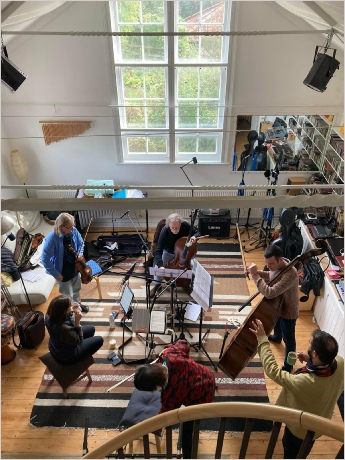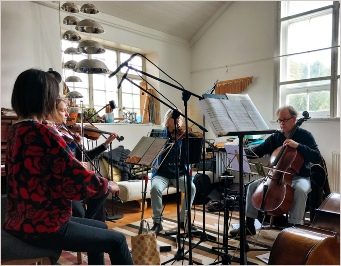Another Timbre TimHarrisonbre
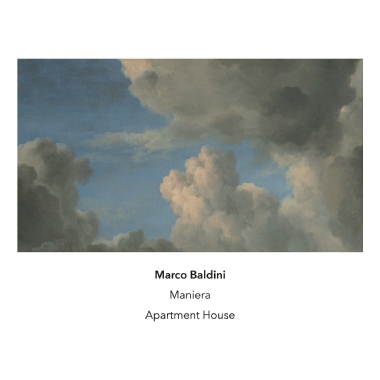
at223 Marco Baldini ‘Maniera’
Seven chamber pieces for strings played by Apartment House
1 Selva (2023) 8:27
Mira Benjamin & Chihiro Ono, violins Bridget Carey, viola Anton Lukoszevieze, cello James Opstad, bass
2 Trio 2 (2022) 5:59
Mira Benjamin, violin Bridget Carey, viola Anton Lukoszevieze, cello
3 Arpocrate (2022) 4:13
Mira Benjamin & Chihiro Ono, violins Bridget Carey, viola Anton Lukoszevieze, cello
4 Plutone (2023) 10:35
Mira Benjamin, violin Bridget Carey & Chihiro Ono, violas Anton Lukoszevieze, cello James Opstad, bass
5 Quintetto (2021) 7:58
Mira Benjamin, violin Bridget Carey & Chihiro Ono, violas Anton Lukoszevieze, cello James Opstad, bass
6 Trio 2 (2022) 5:46
Mira Benjamin & Chihiro Ono, violins Bridget Carey, viola
7 Otto (2023) 6:49
Mira Benjamin & Chihiro Ono, violins Bridget Carey, viola Anton Lukoszevieze, cello
Interview with Marco Baldini
I confess that, though I loved your previous CD Vesperi, I was very surprised at how well it did. So it's great to be releasing something else by you so quickly afterwards. All the pieces on the new disc are for small string ensembles (trios, quartets, quintets). How many of them were written for the CD/Apartment House, and how many existed already?
I must admit that I was surprised as well!
All the compositions in Maniera are quite recent. Selva, Plutone and Otto are the pieces I composed specifically for this project and for Apartment House. Selva is the youngest piece on the record, while Plutone and Otto are two pieces that I composed with Apartment House in mind, still not knowing at the time if they would be performed.
Quintetto is the oldest piece in the set because it was already completed in 2022. I consider it as a bit of a trait d'union, a bridge, between this record and the previous one. It shares some similarities with other pieces on Vesperi - for example, Quartetto, Trio, etc.- which involve the presence of a recurring pattern that could be defined as a refrain/chorus and, but not always, a widespread use of long pauses of silence. I generally name compositions that contemplate these elements in a very basic way with the ensemble number of their voices-for example, Quartetto, Trio, etc. Quintetto is, by the way, the only track on Maniera in which there is a use of silences similar to that which characterized almost all the Vesperi tracks. I chose to include it because I felt that it shares a similar horizon with the overall sound of the record as I imagined it.
Trio 2 is a piece that I drafted at some point in 2022, I guess, and then I completely forgot about it. I revised and modified it extensively after "rediscovering" it in 2023. Although it shares the presence of recurring elements with Quintetto, it is somewhat different - less schematic, more fluid and without silences.
At the recording session you were working with Apartment House for the first time.
How did you find it, and was there anything that surprised you about the way they
work?
Working with Apartment House was a kind of dream come true. Of course, I was familiar
with the musical history, aesthetics and sound of the ensemble, but the direct experience
of being in a recording session with them was incredible and very formative. Albeit
in the rush of a recording session, I could appreciate the remarkable care with which
they approach each piece, and the special attention to the timbral quality of the
musical texture. Mira and Anton's discussions about the choices of which harmonic
or overtone partial to enhance, in order to achieve a particular colour or nuance
to the sound particularly delighted me.
Working with a group that has such a strong musical aesthetic led me to give them carte blanche in interpreting the pieces. This also allowed the music to get rid of some of my hang-ups and mind patterns. For example, while I was composing, I had thought of some of the pieces on the record with a slower tempo. In particular the two versions of Trio 2 were played by Apartment House in cut time instead of regular time as I’d conceived it. At the time I wasn’t convinced about these "fast" versions and would have liked to re-record them in uncut tempo but, afterwards, listening to them again and again I began to appreciate them a lot, and I’ve now decided that those are the definitive versions.
Another example is Otto: Anton had the brilliant idea to mute the whole quartet for this piece, and that was an important choice for the sound of the track. So in general Apartment House's role was crucial and they greatly influenced and shaped the results you hear.
I would also like to mention that, besides being wonderful musicians, Anton, Mira, Bridget, Chihiro and James are also very nice and easy-going people, and this is important for me. Then recording in the beautiful Old School in Starston, which Simon Limbrick has turned into a fantastic studio, was definitely a treat.
Some of the titles are self-explanatory (Trio, Quintetto), but can you tell us what
the other ones mean - Plutone, Arpocrate, Selva and Otto?
Excluding the self-explanatory titled pieces, which I mentioned above, I have no definite pattern for choosing piece names. Most often the name comes after the piece is written or in the process of and may be defined by a suggestion that the music evokes or, if the piece is based on some pre-existing element, something that refers back to the original source.
Selva is a title that came to me by suggestion. The piece is based on a series of seven quite dark-sounding chords that I had written down and then abandoned a couple of years ago. When I started working on the piece I used them as source material, turning them over, trying different permutations of them, etc. To my surprise what came out had a very different feel from the gloomy sound of the original chords. The piece had a relaxed, shifting quality with an Apollonian mood. It immediately made me think of a walk in a forest and the light filtering through the tree canopy. At this point I needed a somewhat austere beginning that could return some tension that would then dissipate in the following movement. I was listening to Bluebeard's Castle (1911) by Béla Bartók a lot at the time, and the seven rooms of the opera immediately made me think of the seven chords I had used to write the piece. This totally random correspondence intrigued me, so I thought of using a small excerpt from Bluebeard's Castle that suited my needs to shape the intro of the piece. All this leads, finally, to the title.
Selva is an Italian word, today sounding somewhat archaic, designating a "wood" or a "small forest," but also "a multitude" or "a tangle." Between the sixteenth and seventeenth centuries it was also used, even in music, as a synonym for miscellany or collection. To cite one example out of all the Selva morale e spirituale (1641) by Claudio Monteverdi. All these shades of meaning I think represented well the sound image I had of the piece.
After all these words someone may think, and I can't fault them for it, that the explanation of the title is more interesting than the piece itself!
The origin of the title Plutone is less abstract. The piece is based on a symphony from Monteverdi's L'Orfeo. Favola in musica (1607). In this composition the original score is as if sent on a loop and each time some harmonic element dissolves until only a distant echo of the initial harmonic structure remains. At first the piece was to be called Caronte, because in the score the symphony is located near the beautiful bass aria O tu ch'innanzi morte sung by the character whom Orfeo meets at the beginning of his catabasis. But the sound of the title didn't convince me much, so I opted for Plutone, whose character appears in the opera shortly afterwards.
Arpocrate is a title chosen a posteriori. I am a big fan of Walter Marchetti, and last year I was asked to curate a performance of the piece La caccia. Quartetto No. 2 and create a visual work related to Arpocrate seduto sul loto (1968) - the book/collection in which the score is contained- for Mezz'aria, an exhibition related to Italian sound art curated by Gabriele Tosi and Nub Project Space that was held at the "Museo del Novecento e del Contemporaneo di Palazzo Fabroni" in Pistoia. So, I had Arpocrate in my head for quite a while. The piece, which is all played in a high-pitched texture, seemed to me to be suitable to express the sound suggestion that the mythological tradition concerning the child god communicated to me.
In contrast Otto has a more prosaic but also sweeter origin. In this piece, which is based on an excerpt from Bartók's String Quartet No. 5, every string always plays double stops through all the piece, so the total number of voices is eight. Otto means eight in Italian. I had written this title, which I thought was absolutely tentative on the score. But it happens that Otto is also the name of my (and my boyfriend’s) dog. I love Otto very much and eventually I got used to this title. In addition, the piece has a somewhat solemn but also serene development, which I thought it was compatible with Otto. So, I decided to keep it!
A quick mention about the album title as well, which may sound a bit weird. "Maniera" or "Manierismo" (Mannerism in english), at least in Italy, was used to identify with a certain scorn an artistic expression that echoed stylistic features of the past or was supposed to lack originality. Manierismo is also the name by which we refer to certain Tuscan art from the 1520s to the Baroque of which the greatest exponents were Pontormo and Rosso Fiorentino. I love them both madly, and if you look at their works you can see that while they drew heavily from 15th-century styles, they had a very strong originality. Maniera is also used for certain Renaissance / Baroque music with the same ambivalence. Sometimes the term Maniera is used similarly to Prattica, but the latter term is more connotative.
Coming to more personal matters, the title also refers to my anxieties as a composer. The idea of not being "contemporary" enough, in the expressive sense of the word, too narrative and not abstract enough, in my music is an intrusive thought that has been buzzing in my head ever since I left the world of free improvisation.
To my mind you need have no worries on that score. I keep coming across works by composers written 30 or 40 years ago which sound wonderfully ‘contemporary’ to me - much more so than a lot of ‘new music’ being produced today. I’m not sure what terms such as ‘cutting edge’ or ‘experimental’ would mean any more. Anyway, are you currently composing any new music, and do you have any interesting commissions or ongoing projects?
I am not a very prolific composer, partly because of time issues, but I am always working on something new. Lately I have been working on a trio for low pitched instruments (possibly cello, bass clarinet and bassoon) and a piece for (many) strings. I also have this idea in progress of a solo piece called Pir for cello with bordone and percussion. I already have the structure in mind, but I need to write it down. Curiously, I am much slower when composing pieces for solo instruments than those for ensemble!
To be honest, I rarely get commissions. However, recently Slovak guitarist Ondrej Vesely asked me for a piece for classical guitar.
As a performer I am collaborating with Werner Dafeldecker on a trumpet and double bass duo project.
Besides this, my ensemble Blutwurst are working on translating and implementing for acoustic ensemble two originally electroacoustic works by Swedish/Finnish composer Marja Ahti, which we are going to present and record before next summer.
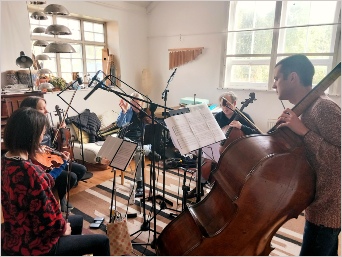
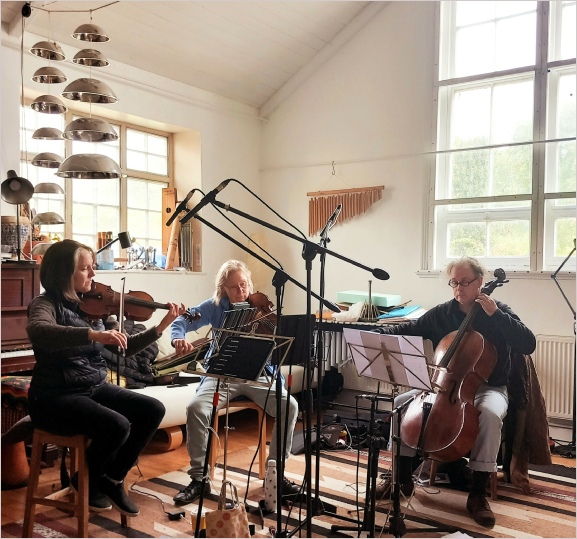
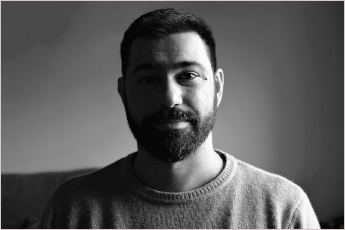
Marco Baldini
